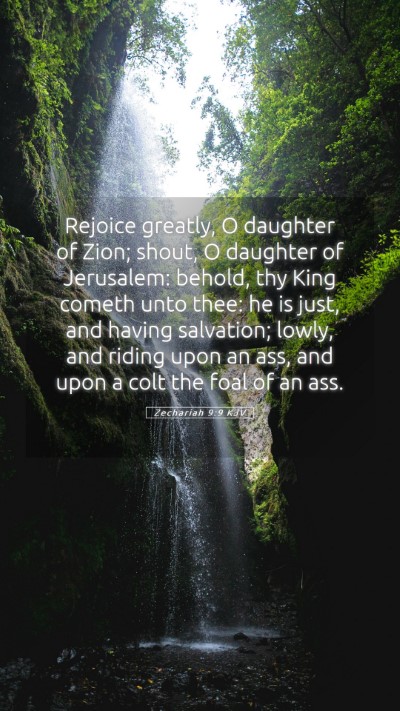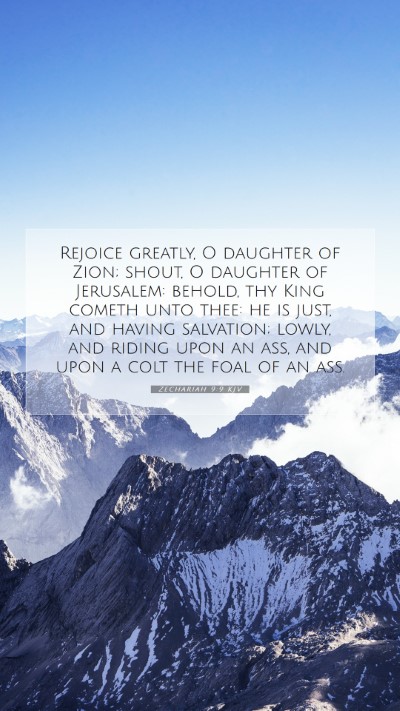Old Testament
Genesis Exodus Leviticus Numbers Deuteronomy Joshua Judges Ruth 1 Samuel 2 Samuel 1 Kings 2 Kings 1 Chronicles 2 Chronicles Ezra Nehemiah Esther Job Psalms Proverbs Ecclesiastes Song of Solomon Isaiah Jeremiah Lamentations Ezekiel Daniel Hosea Joel Amos Obadiah Jonah Micah Nahum Habakkuk Zephaniah Haggai Zechariah MalachiZechariah 9:9 Meaning
What is the meaning of Zechariah 9:9?
Rejoice greatly, O daughter of Zion; shout, O daughter of Jerusalem: behold, thy King cometh unto thee: he is just, and having salvation; lowly, and riding upon an ass, and upon a colt the foal of an ass.
Zechariah 9:9 Bible Verse Meaning
Understanding Zechariah 9:9
Zechariah 9:9 states:
"Rejoice greatly, O daughter of Zion! Shout, O daughter of Jerusalem! Behold, your king is coming to you; He is just and having salvation, lowly and riding on a donkey, a colt, the foal of a donkey."
This verse holds profound significance, particularly within the context of biblical prophecy and its fulfillment in the New Testament. Below is a detailed analysis and interpretation of Zechariah 9:9, drawing insights from renowned public domain commentaries.
Context and Background
The book of Zechariah, written during the time of the Jewish return from Babylonian exile, offers hope and encouragement to a weary people. The prophecies found in this book contain vivid images of restoration and the coming of God's kingdom, culminating in the ultimate revelation of the Messiah.
Verse Breakdown and Commentary
-
"Rejoice greatly, O daughter of Zion!"
This call to rejoice emphasizes the joy that accompanies the arrival of the promised king. Matthew Henry notes that this phrase calls the Jewish people to a joyful expectation of their deliverer (Matthew Henry's Commentary).
-
"Shout, O daughter of Jerusalem!"
Adam Clarke highlights that this shout denotes not merely an outward expression of joy, but a celebration of God's faithfulness and the fulfillment of His promises (Adam Clarke's Commentary).
-
"Behold, your king is coming to you;"
This portion indicates a personal visitation of the king. Albert Barnes emphasizes that God Himself would come to the people—not as a distant ruler, but as one who walks among them, fulfilling the promise of messiahship (Albert Barnes' Notes on the Bible).
-
"He is just and having salvation,"
The description of the king as "just" encapsulates the moral integrity and righteousness of his reign. Matthew Henry associates this virtue with the establishment of peace and justice, showcasing how true salvation must be grounded in righteousness.
-
"lowly and riding on a donkey,"
This imagery stands in stark contrast to worldly kings who ride on horses and parade in splendor. The "donkey" symbolizes humility and peace. Adam Clarke points out that this fulfills the prophecy that the Messiah would arrive in meekness, not as a conqueror, but as a bringer of peace (Adam Clarke's Commentary).
-
"a colt, the foal of a donkey."
The specificity of the foal highlights the fulfillment of prophecy. It emphasizes that this event was predetermined by God. Albert Barnes notes the significance of such humble means to convey the seriousness of Christ's mission (Albert Barnes' Notes on the Bible).
Prophetic Significance
The arrival of Jesus in Jerusalem, as recorded in the New Testament (Matthew 21:5), explicitly demonstrates the fulfillment of Zechariah 9:9. The triumphal entry serves as a pivotal moment in biblical history: a declaration of Jesus as the Messiah, proclaiming His kingship not through power, but humility.
Thematic Insights
-
Joy and Expectation:
The verse encourages believers to anticipate God's redemptive work with joy. It illustrates how faith in God's promises can lead to profound rejoicing among His people.
-
Humility of Christ:
The choice of a donkey symbolizes the nature of Christ's kingship. Unlike typical rulers, He embodies humility, emphasizing that His reign is characterized by servanthood and peace.
-
Fulfillment of Prophecy:
This verse serves as a reminder of God's faithfulness to His promises, showing how specific details unfold within God's divine plan. This reinforces the belief that biblical prophecy is historically and contextually grounded.
Applications for Today
In a contemporary context, Zechariah 9:9 challenges believers to reflect on their own understanding of leadership and expectations of authority. Jesus's humble entry can inspire personal humility and reliance on God's strength and provision.
Conclusion
Zechariah 9:9 encapsulates the essence of Christ's character and mission, urging us to embrace humility, seek justice, and celebrate the joyful arrival of our King. Understanding this verse deepens our engagement with the Scriptures and enriches our spiritual journey.
Related Bible Cross References
- Matthew 21:5 - The fulfillment of Zechariah's prophecy in the New Testament.
- Isaiah 62:11 - A proclamation to the daughter of Zion regarding salvation.
- John 12:14-15 - The account of Christ’s triumphant entry into Jerusalem.


